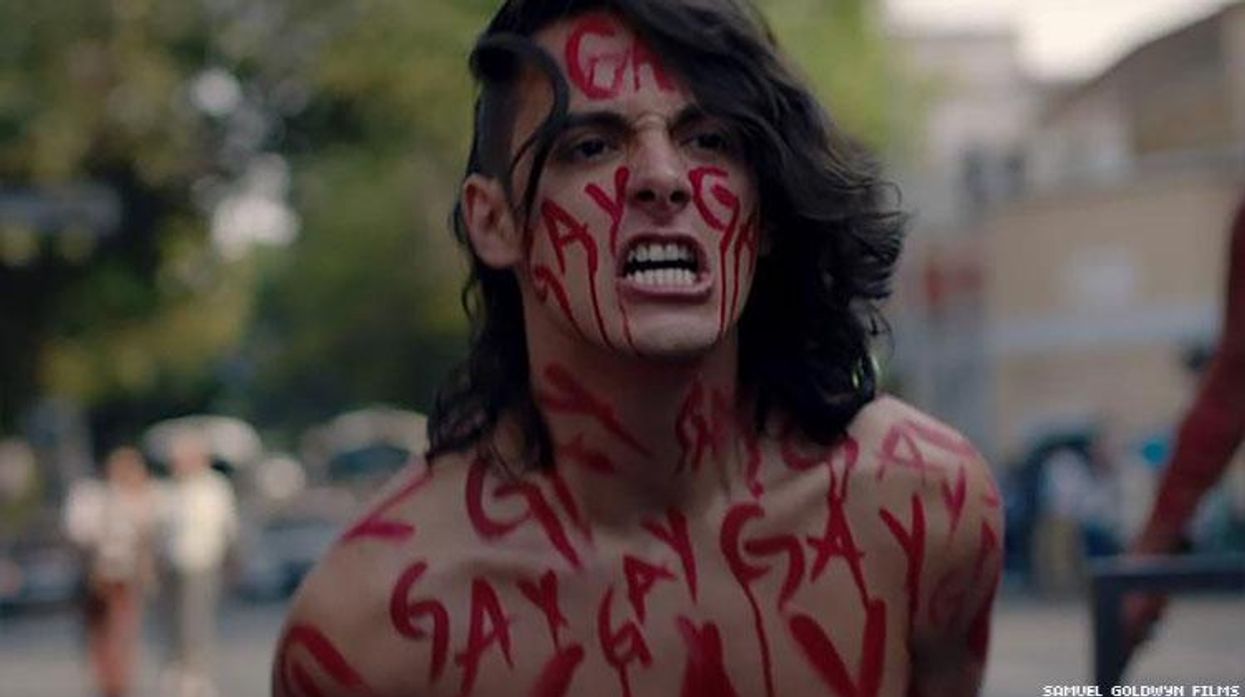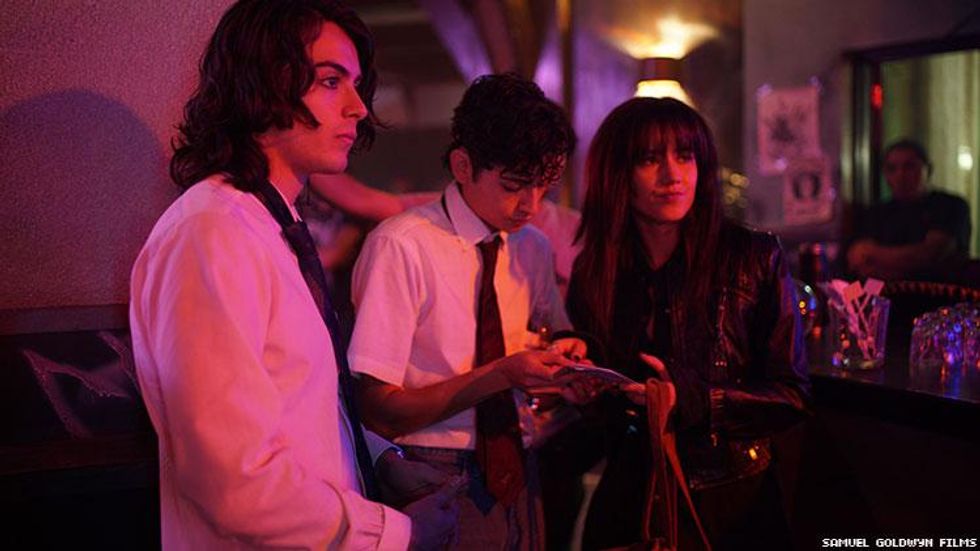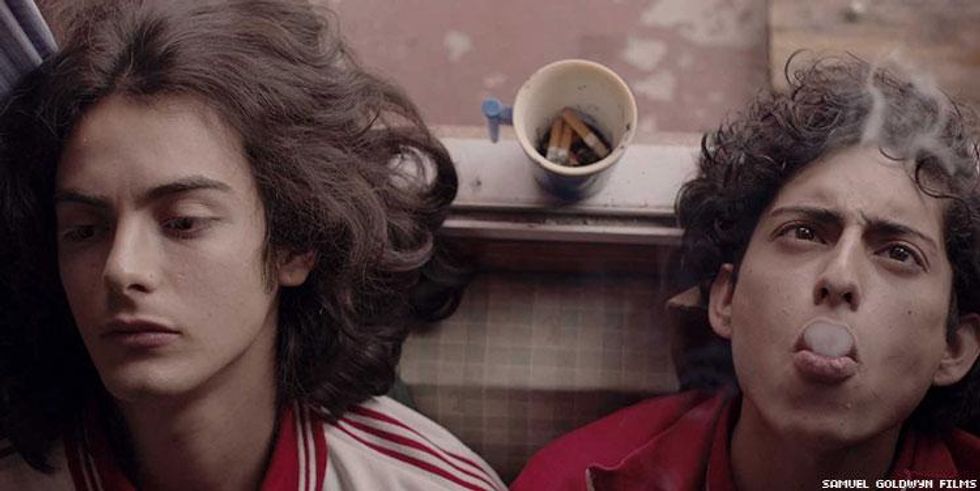This Is Not Berlin (Esto no es Berlin), which premiered at Sundance, was also one of the standouts of this year's Outfest LGBTQ Film Festival. Directed by Hari Sama, the film centers on Carlos (Xabiani Ponce de Leon), a teenager living in Mexico City during the 1986 World Cup.
As the country goes crazy for soccer, Carlos and his friend Gera (Jose Antonio Toledano) begin exploring the city's underground music scene through the Aztec lounge, finding a community of queer artists and activists in the process. While Carlos is not attracted to men, as an outcast, he finds himself drawn to this community and its spirit of rebellion. Gera, who is still coming to terms with his sexuality, has a more difficult journey.
This story of cultural discovery and self-discovery -- which is also a valentine to punk, new wave music, and the art of that era -- was inspired by the youth of Sama. Below, the director discusses the film and its significance.
The Advocate: How much of This Is Not Berlin is based on your own experiences?
Hari Sama: It's a lot based on what I experienced when I was growing up as a teenager. Carlos is pretty much who I was at the time. But there are some changes. My mom, she's seems a little bit more depressed in the film than she used to be. But the whole feeling is very similar.
Can you talk a little bit more about the changes you made? Obviously, it must be difficult as well to review your own life and to put it on the big screen. And I'm curious as to what your process was.
I wrote this screenplay with two friends of mine [Rodrigo Ordonez and Max Zunino] and I shared a lot of my experiences with them. We came out with the basic outline for the film together. My life was always coming into the table and discussing it. But I think once I put my writer's cap on, then the most important thing was the story and to be able to tell the story in a very dramatic and cinematic way.
I did not have a friend like Gera. [However], I thought it was important to have a mirror [of Carlos] and to have a friend that realized that he was attracted to men -- if he had not been able to completely come to terms with that before he comes into this bar. So there were certain changes that I thought made the story more powerful. Gera was one of them. But a lot of what I came to know once I made this group of people, it's very similar to what I lived.
There is a lot of true art from that time that we were fortunate enough to be able to get for the film. ... [One of those artists was] Ricardo Nicolayevsky, who actually was making this Super 8. He was pretty much doing portraits of all his friends from the '80s and '90s, and then he just continued to do that. ... He's now become known to the public. I think he even had a small exhibit in MoMA in New York City. But we were able to show his actual Super 8 films and you can see them in that same garden exhibit when Carlos goes into a room and they are projecting Super 8 films, and that's [his] original films from the '80s. There's always this playing around with reality. I like to do that.
Ricardo Nicolayevsky, Lost Portraits (Excerpt)
Was the Aztec real?
The Aztec was based on a club that was in Mexico City. That was called Le Neuf, in French. The Nine. I think there's a documentary now about that place because it was so important for so many people. But actually, the Aztec lounge is based on a club [of the same name] that I found with my brother in New York City in the '80s. And it was a crazy, underground, dark, inspired club in the East Village.
Was it also "a club for everyone," as your characters called the Aztec?
Yes, it was. There was a lot of clubs that were for everyone in New York City. One of them was probably the Pyramid and the Bank. There were incredible places in New York City. We were all inspired by New York City in those days.

What did it mean to you to screen This Is Not Berlin at an LGBTQ festival like Outfest?
I think it's an honor and it's a privilege. I was very surprised at some point that the film was getting so much interest by the community. It was never my intention to make an openly LGBTQ film. I was just thinking about my life and making the best film possible. And then this started happening and I was really surprised. Then I realized, oh, my God, this is such an incredible opportunity as well -- to be able to communicate in that level with the community that was so important to me for so many reasons.
So do you consider it to be an "LGBTQ film"?
I think it could be translated as an LGBTQ film, but I consider it more of a film in general terms. I'm hoping of a time in which tags will no longer be necessary. I never had that intention, but at the same time, it's obvious it would be an important film for the community since a lot of what it talks about has to do with the community. But I was not intending to do a taggable -- if you will, a "coming of age." I was just trying to be as honest as possible as of what I lived in those years. And in a way, it is a love letter to the community I met in the '80s in Mexico City.
Carlos tries to be gay. Throughout the film, he engages in queer culture but also shies away from it. How does this reflect your own experiences?
I was an outcast forever. I probably still am. And I felt out of place mostly everywhere. And then I met this community and I felt so comfortable. Perhaps for the first time in my life, I thought, Oh, my God, this is the crowd that I need to be around.
I tried to be gay in all possible ways. I'm just not gay, but I felt so much I wanted to belong to this community so badly because I felt so comfortable. I really wanted to just profoundly be there and because my masculinity had never been a typical masculinity, if you will. That's why I identify with the queer tag.
I think Carlos is going through that. He feels completely uncomfortable with the role he has been given by just the circumstances in which he was born into. But he feels completely uncomfortable having to fight and he does not relate to the boys who he has around. And when [he finds] this [queer] crowd, he just feels flabbergasted and he's completely mesmerized by them and fascinated by them. He really wants to belong and he really wants to be there.
I feel that's what happened to me at probably at an even deeper level than what you see with Carlos. I've never stopped being close to the community. Thank God. And I've even had a substitute father from the community. For some reason, I've been in that position without being sexually gay, if that makes any sense.
In the film, Carlos is bullied for his ties to queer culture. Is that something that you went through as well?
Oh, yeah. Yeah. Especially in Mexico City in the '80s, there was no openness whatsoever. The community was nothing they would talk very much about. The whole culture -- the middle-class culture in Mexico that had to do with soccer and fistfighting and all of that -- would never allow for the expression of any sort of same-sex affection. So that was very tough.
Even when I got to film school. This was in the '90s, and of course there were some people from the community in the film atmosphere, but still, I found ... there was still this very manly, stupid thing around how to behave on the set, for instance.

The Advocate will cover soccer occasionally and it's usually tied to homophobia. People will chant homophobic slurs from the crowd, for instance. Soccer has a pretty prominent place in your movie. Did you have that association in your head between a homophobic sports culture and soccer?
I knew that for this film ... that whole underground culture of artists would play a very important role because I wanted the audience to go through what I went through when I was growing up. It's mesmerizing. When you're growing up in the suburbs and you're really not in touch with culture, not in that way. Then you come to these people and it's all so theatrical and all those crazy performances and the music. I was just completely blown away by all that. I wanted the audience to feel a little bit of that, to be completely impressed, like that first performance in which the kids are just destroying someone's car
I realized that these people needed to have a political purpose and [it] needed to be very important. Soccer was a very good antagonist for that. My own 1986 was completely devoted to my Aztec lounge. ... I can't remember a lot because we were using so many drugs. I don't really know what happened. ... But we did have the World Cup going on and it completely changed the face of the city. I do remember that. And [soccer] just became very natural for all of that to become an antagonist of these people that want to make a political point in terms of who they are and how they're not openly [welcome] in this sort of thing that's taken over the country.
This is a period film. But seeing how art was used as both protest and resistance, it also feels grounded in the current political moment. How do you find the issues present in the film to be relevant to today?
Shamefully enough for all of us, these issues are still alive. I would love to live in a world that didn't need to act anymore. It doesn't matter what your film was. I think that we've not gotten there yet at all. There's a lot of work to be done and there's a lot of fighting still to be. This battle is going to continue for a long time still. We're speaking from Los Angeles -- or even Mexico City, which is a very progressive city -- we've had same-sex marriage for a long time. We are privileged in certain urban centers. But look at what happened in London just a couple of months ago. These girls were very badly beaten because of their same-sex love. So there's a lot of work to still be done.
This Is Not Berlin opens Friday in New York and August 23 in Los Angeles, with more cities to follow. Watch the trailer below.
This interview has been edited and condensed.






































































Charlie Kirk DID say stoning gay people was the 'perfect law' — and these other heinous quotes